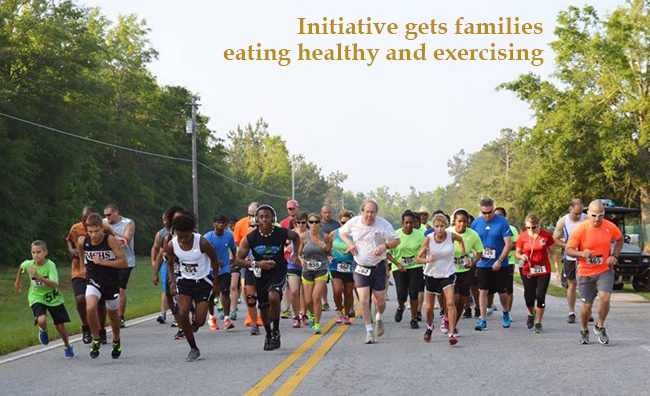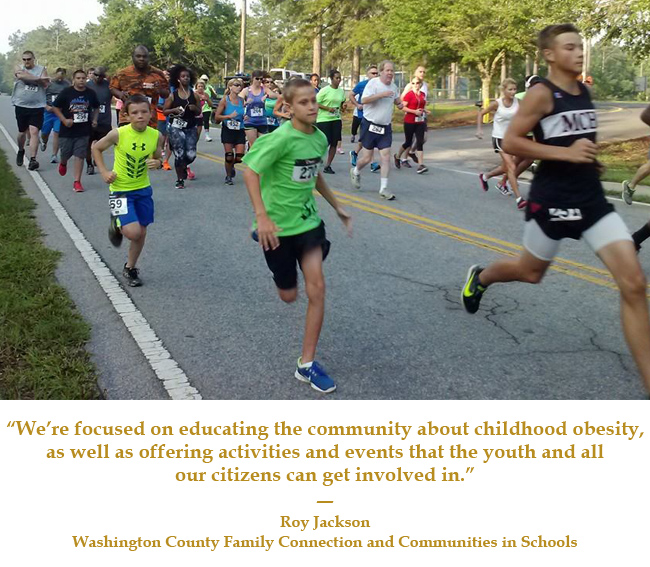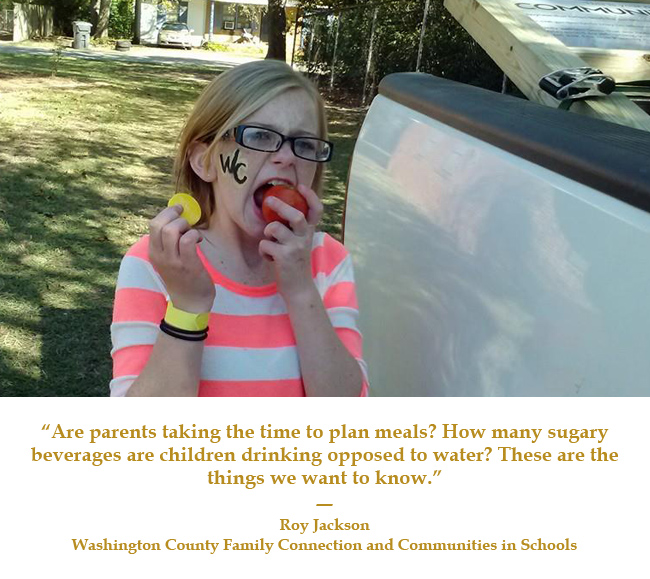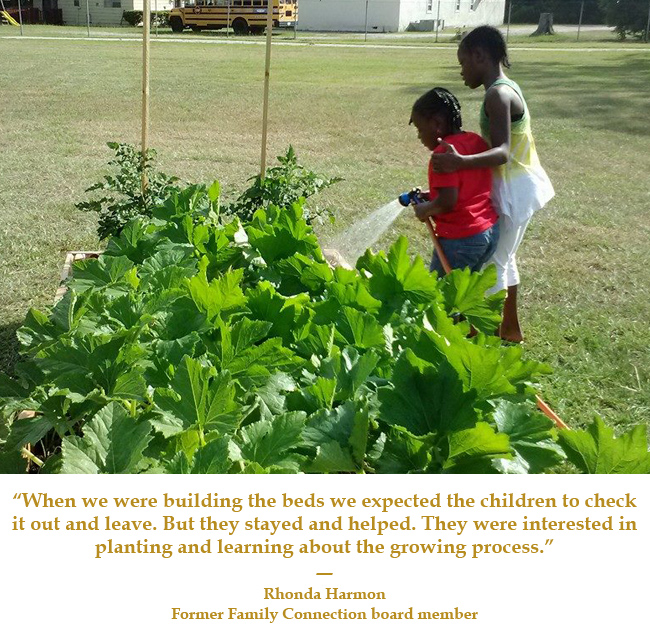Washington County Helping Its Residents Shape Up
Print This Post
by Diana St. Lifer
The message to the more than 20,000 residents of Washington County is loud and clear: Shape Up! And Washington County Family Connection and Communities in Schools is ready to do what it takes to help residents in the 680-square-mile county improve their lives through healthy choices.
Washington is part of the Georgia Family Connection Partnership four-county cohort working to get children’s weight within the healthy fitness zone. While the state is beginning to see progress in reversing the childhood obesity trend among its youngest residents (2 – 4 year olds), Georgia still ranks higher than the national average of 10 – 17 year olds who are overweight or obese.
Roy Jackson, executive director of the Washington County Collaborative for the past 13 years, is hoping Shape Up WaCo will help families realize that small changes in their eating and exercise habits can lead to big results.
“We’re focused on educating the community about childhood obesity as well as offering activities and events that the youth and all our citizens can get involved in,” Jackson said. “It’s all about physical activity and eating healthy.”
Shape Up WaCo sponsored its second annual 5K Run/Walk and a one-mile Fun Run in April. More than 100 people participated in the event, which began and ended at the county recreation department in Sandersville. “We had tremendous community involvement,” said Shannon Jones, a board member of Family Connection and Communities in Schools. “People from all walks of life came out. Many demographics were represented.”

With more time for planning and by holding the event during the school year, the hope is there will be an even larger turnout. The organizers also are considering offering a 12-week training program for participants. “Some people don’t sign up because they think they can’t run a 5K,” said Jones. “A training program would help them set and work toward a goal. Even if some people walk the 5K or one mile, it would be a big accomplishment. It especially will help the kids feel good about themselves and increase their self-esteem.”
Participants also were asked to complete a survey about their current food choices and eating habits. “Are parents taking the time to plan meals? How many sugary beverages are children drinking opposed to water? These are the things we want to know,” said Jackson.
Meal preparation, Jackson maintains, is one of the biggest challenges. “Parents are busy, kids are busy, and family meals aren’t always planned,” he explained. “So right after the soccer or football game parents will drive directly to get fast food.”

That’s why education plays an essential role. Vital information is available at a Health Expo held twice a year where health professionals give presentations and hand out brochures to parents of the county’s 3,500 K – 12 school children, as well as to the general public.
At the preschool level, Washington County has teamed up with Head Start to foster a healthy mindset in the nearly 300 children enrolled in the program. “For the first time last year we held an event during the school day, and we asked parents to attend as well, where we had healthy snacks and smoothies and physical activities,” Jackson said. “We want to do it again.”
Susie Wilcher, executive director of Head Start/Georgia Pre-K, said all children who enter Head Start have a health screening within the first 45 days of school. “We record height and weight and then do it again three months later to determine if they have gained weight normally, gained too much weight, or not enough,” said Wilcher, who has been with Head Start for 37 years. The assessment is done two times after the initial screening and a software program tracks the students’ progression. “If we find a child is obese or anemic, a certified nutritionist meets with the parents to discuss appropriate meal patterns.”
For some parents, the news that their child is heading toward obesity is both surprising and devastating. “Parents can bury their heads in the sand,” Wilcher said. “We had one parent who cried when she found out her child was 30 pounds overweight. It was very sad. Then she saw the importance of working with us to keep her child from gaining more weight. She was not aware of the health issues involved, like hypertension or diabetes, not to mention low self-esteem.”

Wilcher hopes parents will replicate at home the types of foods their children are offered at school. Youngsters in the two Washington County Head Start locations—Sandersville and Davisboro—are served two full meals and a snack each day. A staff nutritionist develops the menu and all cooking is done on site.
“We serve enriched grains and bread, and one-percent milk,” Wilcher said. “There’s not a lot of red meat on the menu and when we offer spaghetti it’s served with ground turkey or turkey sausage. These are great meals.”
There are also no fried food or sugary drinks in school, and students get a chance to learn about different foods before trying them. “When we have a new food item, we discuss it with the children before they go into the lunchroom,” said Wilcher. “We talk about what it is, what it looks like, and where it comes from.”
A similar experience takes place at the recently created community gardens. “The idea was to build gardens so children will see where vegetables come from,” Jackson said. Gardens are located at the Tennille Housing Authority with plans to build others in Sandersville.
Rhonda Harmon, a former Family Connection board member, who was involved in the development of the gardens, said the children in the neighborhood were curious about the project. “They were amazingly receptive,” she said. “When we were building the beds we expected the children to check it out and leave. But they stayed and helped. They were interested in planting and learning about the growing process.”

Other plans in the Shape Up WaCo initiative include accepting food stamps and EBT cards at the farmer’s market, planting fruit trees in select areas throughout the community, and improving playgrounds and creating walking paths to encourage outdoor activity.
“I think participation will increase as we continue to work on these initiatives and make sure everyone in the community knows what we’re doing,” Jackson said. “Hopefully we’ll see some good results.”
Diana St. Lifer is a professional writer with more than 25 years’ experience. She holds a bachelor’s degree in communications, a post-B.A. certificate in child advocacy, and is a certified professional life coach who specializes in teen and adolescent issues.
When 74-year-old Washington County resident Mary Thomas was presented with the opportunity last year to adopt the community garden at her housing development, she gave the green thumbs up. Now her entire community is reaping the benefits gathering and eating natural healthy foods from the harvest.
Read “Mary, Mary, How Does Your Community Garden Grow?”
Low birthweight, childhood obesity, and a literacy gap are serious threats to the well-being of Georgia’s families and children. Recognizing the impact these pressing issues have on the state’s health, safety, and ability to prosper, Georgia Family Connection Partnership has launched three initiatives dedicated to developing and implementing strategies that address these key indicators.
Read “Eleven Family Connection Collaboratives Team Up to Tackle Key Indicators of Child and Family Well-Being.”
